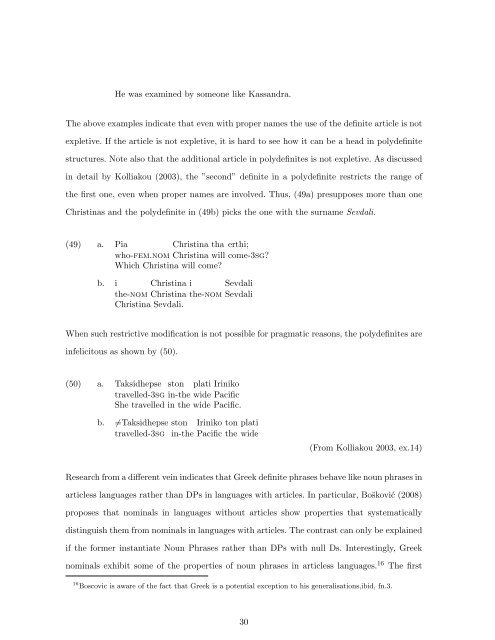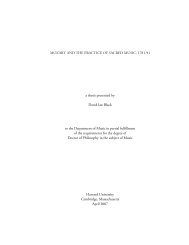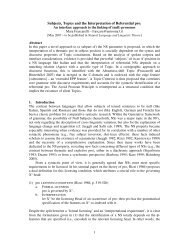draft of November 2011
draft of November 2011
draft of November 2011
You also want an ePaper? Increase the reach of your titles
YUMPU automatically turns print PDFs into web optimized ePapers that Google loves.
He was examined by someone like Kassandra.<br />
The above examples indicate that even with proper names the use <strong>of</strong> the definite article is not<br />
expletive. If the article is not expletive, it is hard to see how it can be a head in polydefinite<br />
structures. Note also that the additional article in polydefinites is not expletive. As discussed<br />
in detail by Kolliakou (2003), the ”second” definite in a polydefinite restricts the range <strong>of</strong><br />
the first one, even when proper names are involved. Thus, (49a) presupposes more than one<br />
Christinas and the polydefinite in (49b) picks the one with the surname Sevdali.<br />
(49) a. Pia<br />
Christina tha erthi;<br />
who-fem.nom Christina will come-3sg?<br />
Which Christina will come?<br />
b. i Christina i Sevdali<br />
the-nom Christina the-nom Sevdali<br />
Christina Sevdali.<br />
When such restrictive modification is not possible for pragmatic reasons, the polydefinites are<br />
infelicitous as shown by (50).<br />
(50) a. Taksidhepse ston plati Iriniko<br />
travelled-3sg in-the wide Pacific<br />
She travelled in the wide Pacific.<br />
b. =Taksidhepse<br />
travelled-3sg<br />
ston Iriniko ton plati<br />
in-the Pacific the wide<br />
(From Kolliakou 2003, ex.14)<br />
Research from a different vein indicates that Greek definite phrases behave like noun phrases in<br />
articless languages rather than DPs in languages with articles. In particular, Bo˘sković (2008)<br />
proposes that nominals in languages without articles show properties that systematically<br />
distinguish them from nominals in languages with articles. The contrast can only be explained<br />
if the former instantiate Noun Phrases rather than DPs with null Ds. Interestingly, Greek<br />
nominals exhibit some <strong>of</strong> the properties <strong>of</strong> noun phrases in articless languages. 16 The first<br />
16 Boscovic is aware <strong>of</strong> the fact that Greek is a potential exception to his generalisations,ibid, fn.3.<br />
30
















